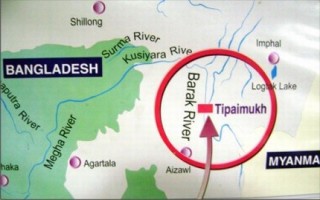India hints at change in Tipaimukh project: Anisul
Water resources minister Anisul Islam Mahmud told the Jatiya Sangsad on Sunday that India had informed Bangladesh that they might change the shape of Tipaimukh hydroelectric project on an international river.
Replying to a question from ruling Awami League lawmaker Nizam Uddin Hazari, he also said that dialogues at various levels were on to ensure no negative impact on Bangladesh if India implemented proposed river interlinking project.
‘A joint survey is going to find out possible impacts of Tipaimukh hydroelectric project,’ Anisul told
parliament, adding, ‘the joint survey would be finalised based on the data provided in light of change of the shape of the project.’
The construction of the proposed 1500 MW Tipaimukh Hydroelectric Project, at downstream of the confluence of the rivers Barak and the Tuivai in Manipur of India just about a kilometre north of Zakiganj in Sylhet, would lead to massive destruction of ecology in the Indian state and Bangladesh, green activists from both the countries said.
The implementation of the project would lead to felling of over 78 lakh trees and 27,000 bamboo shrubs from over 25000 hectares of forest land in Manipur, reported Times of India in June 2013.
Green activists say that these forests are critical habitats of many endangered species including barking deer, gibbons, leopards, grey sibia, serow and the rufous-necked hornbill, the state bird of Manipur.
The project was signed in October 2011 in the presence of then Indian power minister Sushil Kumar Shinde, Manipur chief minister O Ibobi Singh and top National Hydro Power Company officials.
The project envisages construction of 162.80 metre high rock fill dam with an installed capacity of 6X250 MW, with firm power generation of 434.44 MW.
Bangladesh would face adverse effects of the Tipaimukh dam, including environmental deprivation, economic crisis and drought, fear Bangladeshi greens.
Once the project is implemented, Surma-Kushiara and its 60 branches and distributaries may dry up. The river system supports agriculture, irrigation, navigation, drinking water supply, fisheries, wildlife in numerous haors and low lying areas in the entire Sylhet division and some peripheral areas of Dhaka division. The river system also supports internal navigation, wildlife in haors, industries like fertiliser, electricity, gas etc.
- See more at: http://www.newagebd.net/article/8055/india-hints-at-change-in-tipaimukh-project-anisul#sthash.0s0aAHEF.dpuf











